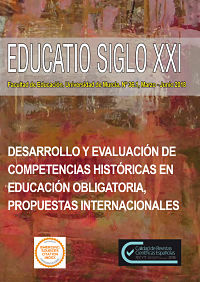Comparative study of the learning approaches of Pedagogy and Primary Education Bachelors’ students
Abstract
The European Higher Education Areaallowed the introduction of significant
changes in universities at the structural,
academic, organizational and manage-
ment levels, although for the students tho-
se changes were materialised in changes
related to their learning processes and in
the ways of dealing with the demands as-
ked by the institution and professors.
Once the Horizon 2010 has passed and
focusing on the Horizon 2020, while still
being in the middle of the process of re-
novating the certification of bachelor and
master titles, the necessity of reflecting on
the results obtained after the whole reform
comes in order to prove if those results are
the ones expected or new reforms should
be undertaken.
From this perspective, an investigation
that analysed the profile and learning approaches of 416 students of the bachelors
of Primary Education and Pedagogy du-
ring three academic years is presented.
The design followed in this investigation
is a non-experimental quantitative study
carried out through a survey. The Study
Process Questionnaire-2 Factors (SPQ) in
its revised and Spanish version (R-CPE-2F)
has been used for the data collection. The
results were analysed with the statistic
package SPSS in its 23 rd version.
The results showed that the predominant
learning approach is the deep approach
and that its percentage of use increases
with the courses. These results are rela-
ted to the quality of learning and the aca-
demic performance, both being, a priori,
adequate.
Downloads
-
Abstract733
-
PDF (Español (España))625
Original work publishes in this journal is subject to the following terms:
1. Murcia University Press (the publishing house) holds the copyright of the publishes work, and favours and allows their reutilization under the use license stated in point 2.
© Servicio de Publicaciones, Universidad de Murcia, 2015
2. Work is published in the electronic edition under a license (Creative Commons Reconocimiento-NoComercial-SinObraDerivada 4.0 España (legal text). They can be copied, used, disseminated, transmitted and publicly presented, as long as: i) authorship and original publication source is acknowledged (journal, publishing house and URL of the work); ii) are not used for commercial purposes; iii) the existence and specifications of this use license is stated.
3. Conditions for self-archive. Authors are allowed and encouraged to disseminate electronically the pre-pint (before review) and/or post-print (accepted for publication) versions of their work before their publication since that favours earlier circulation and dissemination resulting in an increased chance for the authors to be cited and for the work to reach a bigger share of the academic community. Colour: RoMEO: green.








